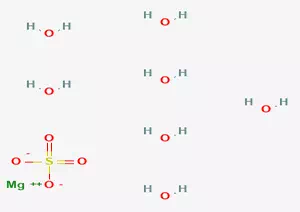In the vast agricultural field, magnesium sulfate heptahydrate plays a crucial role. It is a highly praised high-quality dual-nutrient fertilizer that contains magnesium (Mg) and sulfur (S), both of which are crucial for the growth of crops.
Sulfur and magnesium are both regarded as medium and heavy elements in the growth process of crops, and their importance should not be underestimated. Sulfur, as the fifth major nutrient element for crops, and magnesium, as the sixth major nutrient element, both play irreplaceable roles in the growth and development, physiological metabolism and other aspects of crops.
Magnesium sulfate heptahydrate has a significant effect on increasing yield and improving quality for many crops. Whether it is fruit trees, the abundant fruits hanging all over the branches; It's still potatoes, those plump tubers buried deep underground; Or perhaps grapes, those clusters of crystal-clear fruits; And there is the grass, those patches of lush grassland; As well as oil crops such as soybeans and peanuts, food crops such as vegetables, rice, wheat and rye, economic crops such as tobacco, sugarcane and sugar beets, and even fruit crops such as citrus, magnesium sulfate heptahydrate can all help them grow vigorously. It can not only effectively increase the yield of these crops, allowing farmers' hard work to yield more substantial returns, but also ingeniously improve the taste of fruits, making them sweeter, more juicy and with a richer flavor, which is deeply loved by consumers.
However, in agricultural applications, the use of magnesium sulfate heptahydrate fertilizer must follow the principle of scientific moderation and must not be overused. When used in combination with liquid fertilizer, its concentration generally needs to be strictly controlled within the range of no more than 0.5g/L. This is because once the concentration is too high, it may have adverse effects on the growth environment of crops and thereby interfere with their normal growth. If solid fertilizers are used, when 1,500 kilograms of farmyard manure is applied per mu, the amount of mixed magnesium sulfate is generally around 50 kilograms. If the dosage of magnesium sulfate heptahydrate is too large, it is like exerting excessive pressure on the growth of crops, which will affect the normal growth process of plants, leading to poor development of plants. At the same time, it will also have a negative impact on the quality of fruits, greatly reducing the taste, nutritional components and other aspects of the fruits.
In addition to playing a significant role in crop cultivation, magnesium sulfate heptahydrate also has unique value in the field of livestock feed processing. As an important magnesium supplement, additive and activator, it provides a strong guarantee for the healthy growth of livestock and poultry.
Magnesium is one of the indispensable key elements for maintaining life activities in livestock and poultry. Magnesium is involved in the bone formation process of livestock and poultry, ensuring the firmness and health of the bones. Magnesium also plays an indispensable role when muscles contract, enabling them to relax and contract normally. More importantly, magnesium is an activator of various enzymes in livestock and poultry. These enzymes act like tiny "catalysts", participating in various metabolic reactions within the bodies of livestock and poultry and promoting the orderly progress of life activities.
Magnesium plays an extremely important role in the metabolism and nervous function of livestock and poultry. It is like a "stabilizer" of the nervous system, ensuring the accurate transmission of neural signals and the normal operation of the nervous system. Once livestock and poultry are deficient in magnesium, it will lead to metabolic and neurological dysfunction, and the originally orderly physiological functions will be out of balance, thereby affecting the growth and development of livestock and poultry. This impact is all-round, from the growth of young animals to the production performance of adult livestock and poultry, all will be restricted. In severe cases, it may even lead to the death of livestock and poultry, causing huge losses to the breeding industry.
To ensure the health and strength of livestock and poultry, it is very necessary to add an appropriate amount of magnesium sulfate to feed and drinking water. Especially for dairy cows, the magnesium in magnesium sulfate can meet the needs of their sebum growth, just like injecting a powerful driving force into the healthy growth of dairy cows. It can greatly increase the milk production and quality of dairy cows, providing high-quality milk sources for the dairy industry.
The magnesium ions in magnesium sulfate heptahydrate also have unique pharmacological effects. They have an antagonistic effect on calcium ions and are a physiological calcium antagonist. In the field of medicine, this property is widely applied. It has the effect of calming asthma, can relieve the spasm of the respiratory tract and make breathing smoother. It can also eliminate mucosal edema and bronchospasm, and alleviate the pain of patients. Meanwhile, it can dilate blood vessels and promote blood circulation, and has a certain auxiliary therapeutic effect on some cardiovascular diseases. And it can resist the occurrence of abnormal heart rhythm and platelet aggregation, etc. At present, magnesium sulfate heptahydrate is mainly used in clinical practice to treat volume diarrhea, gallstones, sedation, anticonvulsions and other diseases. This is the important role that magnesium sulfate heptahydrate plays in the field of veterinary drugs, providing strong support for the health of animals and the treatment of diseases.








